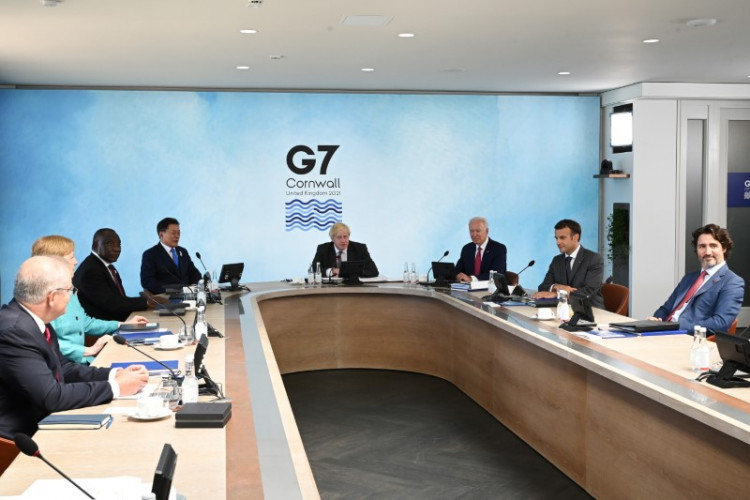The G7, an informal group consisting of seven developed nations and the European Union, held a two-day trade ministerial meeting in Osaka, Japan, from October 28 to 29.
Historically, the G7 framework has seen leaders from the UK, US, France, Germany, Canada, Italy, Japan, and the EU convene annually. The trade ministerial meeting, initiated in 2021 under the UK's leadership, delves into more specific topics than the leaders' summit. These topics, ranging from international trade policies and market access to regulatory cooperation and fostering a fair and open trade system, can influence global economic policies and have significant implications for national businesses.
This meeting continued the G7's tradition of value-driven trade discussions. Notably, beyond routine actions like ensuring supply chain security, the meeting broke new ground by inviting strategically valuable developing countries to participate in this club of developed nations.
According to Japan, the host nation, the meeting saw participation not just from G7 members but also from countries outside the group like Australia, Chile, India, Indonesia, and Kenya. International organizations such as the World Trade Organization, the Organization for Economic Co-operation and Development, ASEAN, and the East Asian Economic Research Institute were also present.
On the first day of the meeting, representatives from resource-rich countries like India, Australia, Chile, Indonesia, and Kenya were invited to an outreach session focused on establishing resilient supply chains for critical minerals.
Japanese media sources suggest that the G7 trade ministers aim to bolster cooperation with resource-rich nations, including less developed countries in the Global South. This is due to the increasingly vital role these nations play in establishing stable supply chains amidst recent geopolitical shifts.
This sentiment was echoed in the joint statement released post-meeting. The statement agreed on enhancing collaboration to establish resilient and reliable supply chains for critical commodities like minerals, semiconductors, and batteries. This would necessitate collaboration with "trusted partners both inside and outside the G7 group."
During a session on "Free and Fair Trade," Japan's Foreign Minister, Yoko Kamikawa, emphasized that the G7 ministers "unanimously agreed" to continue close cooperation. She also highlighted the importance of collaborating with international partners outside the G7, especially countries in the Global South. Additionally, Kamikawa underscored the significance of engaging with relevant nations individually.
Japan's Minister of Economy, Trade, and Industry, Yasutoshi Nishimura, pointed out potential strong allies in fortifying precious metal raw material supply chains, naming Australia and India as examples.
Beyond group discussions, bilateral agreements were also reached on the sidelines. For instance, the UK and Japan agreed on a mineral supply chain cooperation, emphasizing its importance for achieving clean energy and national defense security. Additionally, Japan and the EU reached an agreement on digital data exchange, reaffirming their commitment to jointly develop digital standards.
Furthermore, the ministers "strongly urged" the immediate abolition of unnecessary trade restrictions in the joint statement, including the newly implemented import restrictions on Japanese food products. According to Nishimura's post-meeting press conference, the G7 "broadly supports" the call to lift the import restrictions on Japanese food products.
In response to this call, the Chinese Embassy in Japan stated on the 29th that Japan, despite international concerns, has irresponsibly initiated the release of nuclear-contaminated water into the sea, thereby shifting nuclear pollution risks to the world. To safeguard food safety and public health, nations have the right to take corresponding preventive measures. Japan, as the problem creator, should introspect and rectify its erroneous actions.
Despite strong opposition from neighboring countries, Japan began discharging nuclear-contaminated water from Fukushima on August 24th. To date, two rounds of discharges totaling 15,600 tons of nuclear-contaminated water have been completed, with a third round expected to commence on November 2nd. Following Japan's decision, China completely halted imports of Japanese seafood products. On October 16th, Russia announced similar import restrictions.
While the seafood ban was a focal point, the entire meeting contained several indirect references to China. Although China was not explicitly named, phrases like "economic coercion" and "state-owned enterprises distorting markets" - common G7 criticisms of China - were evident.
For instance, the 10-page joint statement expressed the G7 trade ministers' "concern" over the increasing instances of "coercive economic measures" and "regretted" the weaponization of economic dependencies. They vowed to intensify collective efforts to address these issues and committed to establishing free, fair, and mutually beneficial economic and trade relationships.
In response to the G7's negative overtones towards China, the Chinese Embassy in Japan retorted that economic coercion is a G7 hallmark. They accused G7 members of disrupting a fair competitive environment and destabilizing global supply chain security. The embassy urged them to abandon double standards and, through concrete actions, uphold the normal international trade and investment order.






